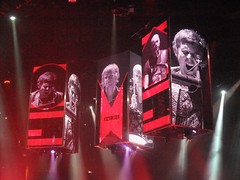 Muse was scheduled to play in Denver on April 6, but the show was canceled when weather prevented their equipment from arriving. This was the rescheduled show. Waiting was probably best, since Matthew Bellamy pointed out last night that "...we don't play for shit acoustic." Regardless, Muse delivered the live show they always promise, creating a spectacular event.
Muse was scheduled to play in Denver on April 6, but the show was canceled when weather prevented their equipment from arriving. This was the rescheduled show. Waiting was probably best, since Matthew Bellamy pointed out last night that "...we don't play for shit acoustic." Regardless, Muse delivered the live show they always promise, creating a spectacular event.Passion Pit
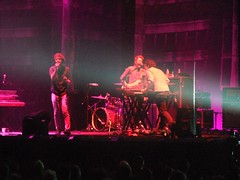 As an opening act, Passion Pit wasn't the best matchup for Muse, but the crowd seemed to enjoy them. Passion Pit played a mix of electro pop/indie pop dance music. Synthesizers were front and center: even the bass and guitar players switched over sometimes. The syncopation, driving beats, and keyboard washes came together to create a Peter Gabriel sound. The front man, Michael Angelakos, had good stage presence and the band put on a good show.
As an opening act, Passion Pit wasn't the best matchup for Muse, but the crowd seemed to enjoy them. Passion Pit played a mix of electro pop/indie pop dance music. Synthesizers were front and center: even the bass and guitar players switched over sometimes. The syncopation, driving beats, and keyboard washes came together to create a Peter Gabriel sound. The front man, Michael Angelakos, had good stage presence and the band put on a good show.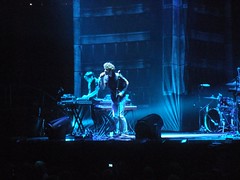 The one quirky part was Angelakos' voice: it's tenor, reaching into countertenor, often sounding almost prepubescent. In general, he had a lot of processing on his vocals and, at times, it sounded like a pitch shifter was raising it even higher. This vocal sound/affectation, combined with a fairly emotional delivery, dominated the songs.
The one quirky part was Angelakos' voice: it's tenor, reaching into countertenor, often sounding almost prepubescent. In general, he had a lot of processing on his vocals and, at times, it sounded like a pitch shifter was raising it even higher. This vocal sound/affectation, combined with a fairly emotional delivery, dominated the songs.Ayad Al Adhamy was pivotal: he had a larger collection of synths and also introduced sampling into the mix. His samples were often used to create crowd response parts, which the real audience took up. He also drove some nice techno synth grooves.
Passion Pit's set was dance heavy and strongly pop. While the synths combined well with Muse's sound, it was a completely different mood. The crowd responded, though. I think the emotional vocal delivery and dance groove caught the collective pulse and meshed with the mindset. In any case, they certainly whetted our appetite for Muse.
Muse
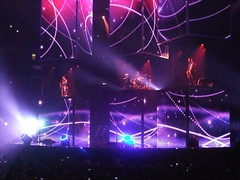 You know it's going to be a good show when you spot the inflatable eyes stashed at the roofline above the seating. While they wouldn't be released until the encore, just knowing they were there fed a sense of anticipation.
You know it's going to be a good show when you spot the inflatable eyes stashed at the roofline above the seating. While they wouldn't be released until the encore, just knowing they were there fed a sense of anticipation.The music started, but Muse wasn't visible yet. The pillars standing on the stage lit up like lights coming on in a building. Finally, the fabric fell away and revealed that each pillar was split in half, with one of the band members set up on the bottom piece and the top half hovering above. Throughout the course of the show, these columns would raise and lower to the stage level and they'd provide a sort of jumbotron display.
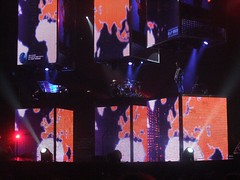 The lights, the lasers, and the stage movement were all elaborate, but Muse played through the spectacle and transcended the technology. The focus was on the music and the experience of the show. It didn't matter how the strobes were timed to match beats of an intense drum break; it was enough to just appreciate it.
The lights, the lasers, and the stage movement were all elaborate, but Muse played through the spectacle and transcended the technology. The focus was on the music and the experience of the show. It didn't matter how the strobes were timed to match beats of an intense drum break; it was enough to just appreciate it.The band ran through songs from the last several albums. On the whole, they emphasized their prog rock sound, with a fair amount of harder rock touches. So, songs like Knights of Cydonia, a funky version of Supermassive Black Hole, and the trippy drive of Resistance all built up a great sonic intensity, getting the crowd moving and immersed. The setlist was dynamic, too, shifting the mood with songs like the U2 influenced Starlight (in this case, dedicated to Belle) or the cool descending piano line of Feeling Good.
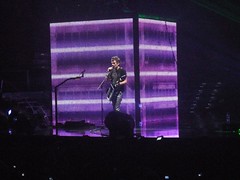 Matthew Bellamy's stage presence was perfect. He'd smoothly shift from nonchalantly playing an intense guitar figure to working the crowd with an emotional scream. Using a spotlight reflected off his guitar, he'd scan the audience. His voice had some of Bono's quality as he moved from small, personal lyrics to larger philosophical themes of revolution.
Matthew Bellamy's stage presence was perfect. He'd smoothly shift from nonchalantly playing an intense guitar figure to working the crowd with an emotional scream. Using a spotlight reflected off his guitar, he'd scan the audience. His voice had some of Bono's quality as he moved from small, personal lyrics to larger philosophical themes of revolution.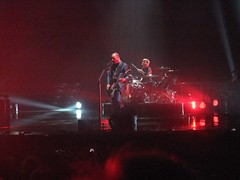 Christopher Wolstenholme's bass work was great, too, going from progressive drive to a house style drum and grindy bass. Dominic Howard's drumming was tight. The progressive material gave him plenty of room to throw in fills, without compromising the heartbeat of the songs. The band also had some occasional help from Morgan Nicholls on keys.
Christopher Wolstenholme's bass work was great, too, going from progressive drive to a house style drum and grindy bass. Dominic Howard's drumming was tight. The progressive material gave him plenty of room to throw in fills, without compromising the heartbeat of the songs. The band also had some occasional help from Morgan Nicholls on keys.The band tossed in a couple of Led Zeppelin teases that were all too short. Hearing them play Black Dog or Moby Dick would be awesome. They also started off Time Is Running Out with an instrumental cover of House of the Rising Sun. There was a great moment as the chords shifted from Rising Sun into the dark drive of Time Is Running Out. The crowd sang along.
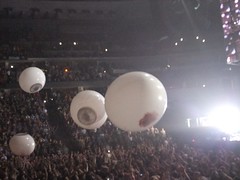 The show was great. There was a brief wait before they came out for the encore. The eyeballs were released and Muse played another three songs, including a metal guitar tinged Stockholm Syndrome. It all ended too soon, but it was a show to remember.
The show was great. There was a brief wait before they came out for the encore. The eyeballs were released and Muse played another three songs, including a metal guitar tinged Stockholm Syndrome. It all ended too soon, but it was a show to remember.I would have liked a suitably complex beer, like Odell's Imperial Pilsener to go with the show. Alas, that wasn't a choice at the Pepsi Center.
More photos on my Flickr.

No comments:
Post a Comment